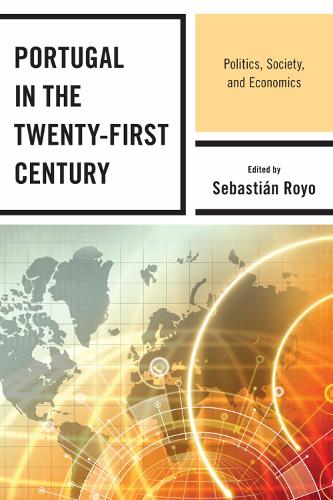
Portugal in the Twenty-First Century: Politics, Society, and Economics
(Paperback)
Publishing Details
Portugal in the Twenty-First Century: Politics, Society, and Economics
By (Author) Sebastin Royo
Contributions by Michael Baum
Contributions by Ana Maria Evans
Contributions by Robert M. Fishman
Contributions by Miguele Glatzer
Contributions by Marina Costa Lobo
Contributions by Pedro C. Magalhes
Contributions by Octavio Amorim Neto
Contributions by Antnio Costa Pinto
Contributions by Antnio Goucha Soares
Bloomsbury Publishing PLC
Lexington Books
4th November 2011
United States
Classifications
Tertiary Education
Non Fiction
327.469
Physical Properties
Paperback
290
Width 155mm, Height 231mm, Spine 21mm
435g
Description
Portugal in the Twenty-First Century: Politics, Society, and Economics, edited by Sebastin Royo, reflects on the legacies of authoritarianism on the democratization process and addresses issues related to Portugal's integration into the European Union, with the perspective offered by its twenty-three years of membership.
Portugal in the Twenty-First Century reflects on what has happened in the country and in Europe during the last three decades. The analysis is divided into two sections: political and sociological perspectives, and economic and social perspectives. The contributors identify basic changes in the economy and society of Portugal that occurred as a result of the democratization and European integration processes. They also assess the impact that these changes have had on the quality of Portuguese democracy, and on the country's economic development. Royo's collection reflects on how far Portugal has come since the Carnation Revolution in 1974 in order to better understand where it is headed now, at the dawn of the twenty-first century.
Portugal in the Twenty-First Century: Politics, Society, and Economics, edited by Sebastin Royo, provides an original series of analyses of the development of Portuguese politics, sociology, and economics since the transition to democracy and the accession to the European Union. Drawing on the research by established scholars, Royo offers an up-to-date assessment of Portuguese political and economic issues. It is essential reading for those interested in understanding contemporary Portugal.
Reviews
"This book illustrates a new generation of Portuguese social scientists that has done much to renew and reinvigorate the status of political sciences in Portugal and strengthened the field both in the public arena and in academic circles. A welcome addition to the field of Iberian studies, engaging and accessible to readers in Portugal and abroad." Pedro Nuno Teixeira, University of Porto -- Pedro Nuno Teixeira, University of Porto
It is about time that contemporary Portuguese politics, society, and economy received such a comprehensive treatment. This book not only demonstrates the high level of competence of the scholarsnative and foreignworking on this long neglected country, but it also succeeds in placing Portugal in a broader matrix of theoretical issues: globalization, European integration, democratization, and modernization. No one interested specifically in comparing the recent experiences of Southern Europe or even more generically in exploring these broader issues should pass it by. Os meus parabens! is the best expression I can think to recognize the quality of its authors collective effort.Philippe C. Schmitter, European University Institute -- Phillippe C. Schmitter
Through well-grounded historical comparative research, this book offers new and refreshing ideas on issues like democratization, Europeanization, institutions, and the political economy. It will be of major interest to the academic community and the general public.Tiago Fernandes, Universidade Nova de Lisboa -- Tiago Fernandes, Universidade Nova de Lisboa
The contributions to Royos volume on Portugal are uniformly excellent. They present a comprehensive and well-supported assessment of the development of Portuguese politics and society in the three and a half decades of democracy since the Carnation Revolution of 1974. Essential reading for anyone interested in the politics and political economy of Southern Europe.John D. Stephens, University of North Carolina -- John D. Stephens, University of North Carolina
Author Bio
Sebastin Royo is associate dean of the college of arts and sciences and associate professor of government at Suffolk University in Boston.
